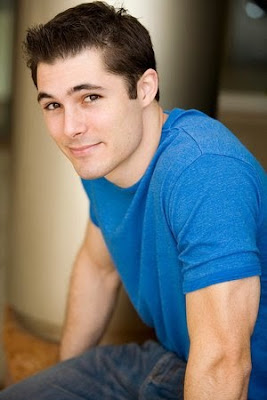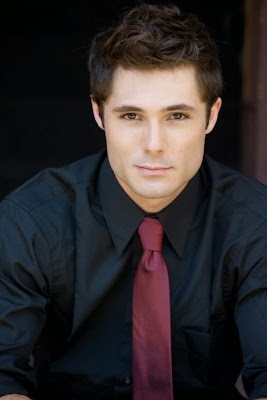Rating: NC-17 (for explicit sexual content)
Genre: Mystery & Suspense, Drama
Directed By: Everett Lewis
Written By: Everett Lewis
In Theaters: Jul 14, 2009 Wide
On DVD: Dec 14, 2009
Runtime: 1 hr. 35 min.
Rusty is a successful, respected and attractive restoration architect. He's also gay. With his lover Daniel away on a business trip, and his business partner Garrett making a couple professional missteps, Rusty finds himself taking in Denny, a meth-addicted, HIV-positive transient who soon starts leading Rusty around. Is this love, lust, or a new restoration project for Rusty? Rusty himself isn't certain.
Rusty là một kiến trúc sư tái thiết thành công, được trọng vọng và hấp dẫn. Anh ta cũng là một anh chàng đồng tính. Trong khi người yêu là Daniel đang đi công việc xa, và bạn công việc là Garrett vừa phạm một vài lỗi lầm về chuyên môn, Rusty đưa Denny, vốn là một tay nhiễm HIV và nghiện ma túy đá về nhà ở tạm. Denny nhanh chóng dẫn dắt Rusty vào trong vòng lẩn quẩn. Đây là tình yêu, dục vọng, hay là một dự án khôi phục mới cho Rusty? Bản thân Rusty không chắc chắn lắm.
| Lucky Bastard | |
|---|---|

Promotional poster
| |
| Directed by | Everett Lewis |
| Produced by | Charles Myers Robert Shulevitz Scott Arundale |
| Written by | Everett Lewis |
| Starring | Patrick Tatten Dale Dymkoski Johnny Kostrey Timothy Cole |
| Cinematography | Linda J. Brown |
Release dates
|
|
Running time
| 95 minutes |
| Country | United States |
| Language | English |
Principal cast
Patrick Tatten as Rusty
Dale Dymkoski as Denny
Johnny Kostrey as Daniel
Timothy Cole as Garrett
Critical response
Critical reaction to Lucky Bastard has been sharply divided. L.A. Splash magazine called the film "the first disappointment" of the Outfest festival, citing Rusty's lack of visible emotional development and "two dimensional personae (sic)". The reviewer praises Dale Dymkoski's performance as Denny, noting the "desperate duplicity" he brings to the role. The film, she concludes, focuses on the wrong protagonist.[4] The LGBT news and entertainment portal Edge concurs in this assessment. Noting that the film's premise would make for an interesting character study by examining why Rusty is so willing to jeopardize his relationship with his boyfriend, the reviewer concludes, "There is nothing going on here. No plot. No sense of time or place. No character development or plot momentum of any kind. We just watch a decent guy fall for a loser and wonder why?" Dismissing the camerawork as "strictly film-school" with little variance in shot or angle and although appreciative of the attractiveness of the two leads, the reviewer chides Lewis to remember that "Hunky boys do not a good film make."[5] Conversely, the Philadelphia Gay News calls Lucky Bastard a "bold and compelling drama" in which Lewis "takes a mature and more intimate direction". PGN cites Denny's monologue in particular, calling it "an emotional, dramatic moment that will likely rivet most viewers".
Lewis anticipated this divided response. "I think that people in the gay community are going to see the film is right on the button, or not at all close. They will accept it strongly or dismiss it because they have their own experience of many of these issues."
Lucky Bastard
by Kevin Taft
Contributor
Thursday Jul 16, 2009
Hunky boys do not a good film make. This really needs to be the "go-to" phrase at the end of every gay film festival, yet it seems Lucky Bastard missed the memo. Hunky boys serve as a distraction, yes, but they can’t make a film any better.
Written and Directed by Everett Lewis, Lucky Bastard takes place mainly in a hotel room rented out by a successful architect named Rusty (Patrick Tatten.)
Why he actually lives in a hotel room is uncertain especially with the money he is making designing houses. Also uncertain is the fact that he has a boyfriend who leaves town for weeks on end but seems to want to be in a committed relationship. Not really the best of circumstances for a flourishing romance.
Worse still, Rusty meets hunky bad-boy Denny (Dale Dymkoski) at a convenience store and in minutes, the two are screwing around in a backroom. Denny is a hot, well-built guy and Patrick is a hunk of dark haired goodness, so the visual eye-candy is all well and good. But what the hell is Rusty thinking?
Not only does he have (what appears to be) a solid relationship, but this Denny guy wants money... is codependent... is unfaithful.... over-eager... has a crystal habit... did porn.... I mean... this guy has more red flags than a Russian army.
Yet, somehow, for reasons unknown still, Denny and Rusty fall in love. Rusty excuses the drug habit and the theft of hundreds of dollars because he clings to this phantom love he claims to have for a guy he has nothing in common with and met only days before.
Unfortunately, this makes Rusty look like a putz, and Denny seem like an incredible jerk. Not two people I’d prefer to spend an hour and half with.
Denny is a hot mess. Literally. His body alone keeps the audience from napping, but that’s not enough. There is nothing going on here. No plot. No sense of time or place. No character development or plot momentum of any kind. We just watch a decent guy fall for a loser and wonder why? Then we remember the good guy has a boyfriend so that just makes his quick decent into love all that more icky.
The cinematography and direction are strictly film-school, with the camera not moving away from either a static two-shot or dull one-shot for minutes at a time.
What s unfortunate is that there is an interesting story buried underneath the monotony. Delving into Rusty’s reasons for not only putting his relationship in jeopardy, but for allowing a messed-up guy to take advantage of him is ripe for an interesting character study.
What is it that Denny is looking for from Rusty and why does he perpetuate the abuse? These are the questions that would make for an interesting story. But without any answers or any sort of literate dive inside these men’s minds, we’re left with two men that look good, but that we pity in a way that just makes us want to look away.
Kevin Taft is a screenwriter/critic living in Los Angeles with an unnatural attachment to 'Star Wars' and the desire to be adopted by Steven Spielberg.
by Kevin Taft
Contributor
Thursday Jul 16, 2009
Hunky boys do not a good film make. This really needs to be the "go-to" phrase at the end of every gay film festival, yet it seems Lucky Bastard missed the memo. Hunky boys serve as a distraction, yes, but they can’t make a film any better.
Written and Directed by Everett Lewis, Lucky Bastard takes place mainly in a hotel room rented out by a successful architect named Rusty (Patrick Tatten.)
Why he actually lives in a hotel room is uncertain especially with the money he is making designing houses. Also uncertain is the fact that he has a boyfriend who leaves town for weeks on end but seems to want to be in a committed relationship. Not really the best of circumstances for a flourishing romance.
Worse still, Rusty meets hunky bad-boy Denny (Dale Dymkoski) at a convenience store and in minutes, the two are screwing around in a backroom. Denny is a hot, well-built guy and Patrick is a hunk of dark haired goodness, so the visual eye-candy is all well and good. But what the hell is Rusty thinking?
Not only does he have (what appears to be) a solid relationship, but this Denny guy wants money... is codependent... is unfaithful.... over-eager... has a crystal habit... did porn.... I mean... this guy has more red flags than a Russian army.
Yet, somehow, for reasons unknown still, Denny and Rusty fall in love. Rusty excuses the drug habit and the theft of hundreds of dollars because he clings to this phantom love he claims to have for a guy he has nothing in common with and met only days before.
Unfortunately, this makes Rusty look like a putz, and Denny seem like an incredible jerk. Not two people I’d prefer to spend an hour and half with.
Denny is a hot mess. Literally. His body alone keeps the audience from napping, but that’s not enough. There is nothing going on here. No plot. No sense of time or place. No character development or plot momentum of any kind. We just watch a decent guy fall for a loser and wonder why? Then we remember the good guy has a boyfriend so that just makes his quick decent into love all that more icky.
The cinematography and direction are strictly film-school, with the camera not moving away from either a static two-shot or dull one-shot for minutes at a time.
What s unfortunate is that there is an interesting story buried underneath the monotony. Delving into Rusty’s reasons for not only putting his relationship in jeopardy, but for allowing a messed-up guy to take advantage of him is ripe for an interesting character study.
What is it that Denny is looking for from Rusty and why does he perpetuate the abuse? These are the questions that would make for an interesting story. But without any answers or any sort of literate dive inside these men’s minds, we’re left with two men that look good, but that we pity in a way that just makes us want to look away.
Kevin Taft is a screenwriter/critic living in Los Angeles with an unnatural attachment to 'Star Wars' and the desire to be adopted by Steven Spielberg.


























No comments:
Post a Comment